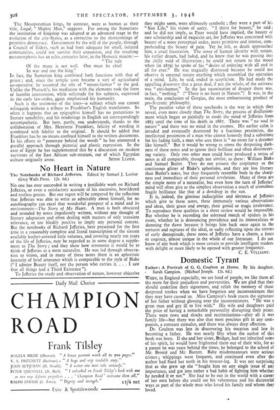No Heart in Nature
The Notebooks of Richard Jefferies. Edited by Samuel J. Looker (Grey Walls Press. 12s. 6d.)
No one has ever succeeded in writing a justifiable work on Richard Jefferies, or even a satisfactory account of his excursive, bewildered and restless genius. But our regret will be tempered by the reflection that Jefferies was able to write so admirably about himself, for no autobiography can excel that wonderful prospect of a mind and its environment—The Story of My Heart. A man is both obscured and revealed by notes impulsively written, without any thought of literary adaptation and often dealing with matters of only transient relevance, or too bleakly positive to imply any personal context. But the notebooks of Richard Jefferies, here presented for the first time in a reasonably complete and literal transcription of the sixteen available leather-covered little volumes, and covering nearly ten years of the life of Jefferies, may be regarded as in some degree a supple- ment to The Story ; and they show how erroneous it would be to think of Jefferies as a mere naturalist. He was led through observa- tion to vision, and in many of these notes there is an aphoristic intensity of brief utterance which is comparable to the style of Blake (" I admire Beauty itself, not the person who carries it. . . . I saw that all things had a Third Existence ").
To Jefferies the study and observation of nature, however objective
they might seem, were ultimately symbolic ; they were a part of his "Sun Life," his vision of unity. "I thirst for beauty," he said ; and he did not imply, as Pater would have implied, the beauty of rare scholarship and of exquisite art, for Jefferies was concerned with beauty of a more perceptual order, more primitive and intense, com- prehending the beauty Of pain. Yet he felt, as death approached him, a cruel frustration. The sense of human identity with nature, his earlier dream, had faded, and he knew that he was passing into the chilly void of illustration ; he could not return to the mood when (in 1879) he spoke of his "desire of enjoying with all and in all for ever." He was tragically distressed because he could not observe in external nature anything which resembled the operation of a mind. Life, he said, ended in scepticism. He had made the appalling discovery that a great deal, if not the whole, of the universe was "anti-human." In the last examination of despair there was, in fact, "nothing." ("There is no heart in Nature.") It was, in the main, the conclusion of Gorgias, the most embarrassing product of pre-Socratic philosophy. The peculiar value of these notebooks is the way in which they reveal, even more closely than The Story, the process of disillusion- ment which began so painfully to erode the mind of Jefferies from 1883 until the time of his death in 1887. There was "no soul in nature" and there was no mind in the cosmos. His earlier calm is invaded and eventually destroyed by a fractious pessimism, the intellectual pessimism of a man who cannot honestly find a substitute for his fading faith, a man who sees there is "no room for a dreamer like himself.' But it would be wrong to stress the deepening dark- ness of these notes and to ignore their brilliant and often disconcert- ing variety. Only two other men could have produced a series of notes at all comparable, though not similar, to these : William Blake and Samuel Butler. They do not possess the crepitancy or the continuous glitter of Blake's aphorisms, and they are less literary than Butler's notes, but they frequently resemble both in the sharp- ness and immediacy of their personal revelation. Many of them are the simple notes of a naturalist, but even here the turn of Jefferies' mind will often give to the simplest observation a touch of tremulous fragile brilliance like that of a dewdrop in the sun.
It is, indeed, the glorious indiscipline and alertness of Jefferies which give to these notes, these immensely various observations and ideas, their grace and energy, their genial or tragic irrelevance. To reproduce these qualities in a short review would be impossible. But whether he is recording the tolerated march of spiders in his room, whether he is denouncing providence and its immoralities or damning the dawn because it brings him back once again to the tortures and raptures of the ideal, or sadly reflecting upon the terrors of early decrepitude, these notes of Jefferies have a charm, a force or cogency, almost unique in the whole of our literature. I do not know of any book which is more certain to provide intelligent readers with delight or more likely to be opened with greater frequency.
C. E. VULLIAMT.


































 Previous page
Previous page